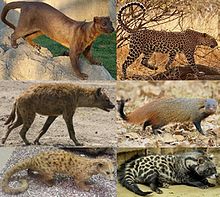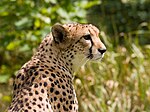Feliformia
| Feliforms Temporal range:Middle Eocene-Holocene
| |
|---|---|

| |
| Clockwise from top-left:fossa(familyEupleridae),leopard(familyFelidae),stripe-necked mongoose(familyHerpestidae),African civet(familyViverridae),two-spotted palm civet(familyNandiniidae),spotted hyena(familyHyaenidae) | |
| Scientific classification | |
| Domain: | Eukaryota |
| Kingdom: | Animalia |
| Phylum: | Chordata |
| Class: | Mammalia |
| Order: | Carnivora |
| Suborder: | Feliformia Kretzoi,1945 |
| Families | |
| |
Feliformiais a suborder within the orderCarnivoraconsisting of "cat-like" carnivorans, includingcats(large and small),hyenas,mongooses,viverrids,and relatedtaxa.Feliformia stands in contrast to the other suborder of Carnivora,Caniformia(also Canoidea, "dog-like" carnivorans).[1]
The separation of the Carnivora into the broad groups of feliforms and caniforms is widely accepted, as is the definition of Feliformia and Caniformia as suborders (sometimes superfamilies). The classification of feliforms as part of the Feliformia suborder or under separate groupings continues to evolve.
Systematic classifications dealing with onlyextant taxainclude all feliforms into the Feliformia suborder, though variations exist in the definition and grouping of families and genera.[2][3]Indeed, molecular phylogenies suggest that all extant Feliformia aremonophyletic.[4]
Systematic classifications dealing with both extant and extinct taxa vary more widely.[5][6]Some separate the feliforms (extant and extinct) as Aeluroidea (superfamily) and Feliformia (suborder).[6]Others include all feliforms (extant, extinct and "possible ancestors" ) into the Feliformia suborder.[5]Some studies suggest this inclusion of "possible ancestors" into Feliformia (or even Carnivora) may be spurious.[7]The extinct (†) families as reflected in the taxa chart are the least problematic in terms of their relationship with extant feliforms (with the most problematic beingNimravidae).
Characteristics[edit]

All extant feliforms share a common attribute: theirauditory bullae(bony capsules enclosing themiddleandinner ear).[8]This is a key diagnostic in classifying species as feliform versus caniform. In feliforms, the auditory bullae are double-chambered, composed of two bones joined by aseptum.Caniforms have single-chambered or partially divided auditory bullae, composed of a single bone. This feature, however, is problematic for the classification of the extinctNimravidaeas feliforms. Nimravid fossils showossifiedbullae with no septum, or no trace at all of the entire bulla. It is assumed that they had acartilaginoushousing of the ear mechanism.[9]
The specific characteristics of extant feliform bullae suggest a common ancestor, though one has not been identified in thefossilrecords. There are other characteristics that differentiate feliforms from caniforms and probably existed in their stem taxa. But, due to speciation, these do not apply unambiguously to all extant species.
Feliforms tend to have shorterrostrums(snouts) than caniforms, fewer teeth, and more specializedcarnassials.Feliforms tend to be more carnivorous and are generally ambush hunters. Caniforms tend more toward omnivorous and opportunity-based feeding. However, omnivorous feliforms also exist, particularly in the familyViverridae.
Many feliforms have retractile or semi-retractile claws and many arearborealor semi-arboreal. Feliforms also tend to be moredigitigrade(walking on toes). Most caniforms are terrestrial and have non-retractile claws.
Extant families[edit]





Seven families are extant, with 12 subfamilies, 56 genera, and 114 species in the Feliformia suborder. They range natively across all continents exceptAustraliaandAntarctica.Most species are arboreal or semiarboreal ambush hunters. Target prey vary based on the species size and available food sources (with the larger species feeding mainly on small mammals and the smallest species feeding oninsectsorinvertebrates).
An overview of each family is provided here. For detailed taxa and descriptions of the species in each family, follow the links to other articles and external references.
FamilyEupleridae(the "Malagasy carnivorans" ) includesfossa,falanouc,Malagasy civetandMalagasy mongooses,all of which are restricted to the island ofMadagascar.The eight species in the family exhibit significant variations in form. These differences initially led to the species in this family sharing common names with, and being placed in the different families of, apparently more similar species on the mainland (e.g. civets and mongoose). However, phylogenetic analysis ofDNAprovides strong evidence that allMalagasycarnivorans evolved from a single common ancestor that was a herpestid (Yoder et al. 2003).[10][11]Phylogenetic analysis supports this view and places all of the Malagasy carnivorans in the family Eupleridae.[12]
The differences in form make it difficult to concisely summarise the species in this family. The range in size is as diverse as the range in form, with smaller species at less than 500 g (1 lb) and the largest species at up to 12 kg (26 lb). Some have retractile or semi-retractile claws (the fossa and the Malagasy civet) and others do not (the falanouc and Malagasy mongooses). They all tend to have slender bodies and pointed rostra (except the fossa, which has a blunt snout). Diet varies with size and form of the species and, like their mainland counterparts, ranges from small mammals, insects and invertebrates through to crustaceans and molluscs.
FamilyFelidae(cats) are the most widespread of the "cat-like" carnivorans. There are 41 extant species, and all but a few have retractile claws. This family is represented on all continents except for Australia (wheredomestic catshave beenintroduced) and Antarctica. The species vary in size from the tinyblack-footed cat(Felis nigripes) at only 2 kg (4.5 lb) to thetiger(Panthera tigris) at 300 kg (660 lb). Diet ranges from large to small mammals,birdsand insects (depending on species size).
FamilyHyaenidae(hyenasandaardwolf) has four extant species and two subspecies. All show features ofconvergent evolutionwithcanids,including non-retractile claws, long muzzles, and adaptations to running for long distances. They are extant in theMiddle East,IndiaandAfrica.Hyenas are large, powerful animals, up to 80 kg (176 lb) and represent one of the most prolific large carnivorans on the planet. Theaardwolfis much smaller and is a specialised feeder, eating mainly harvester termites.
FamilyHerpestidae(mongooses,kusimanses,and themeerkat) has 32 species. Previously, these were placed in the family Viverridae. However, Wilson and Reeder (1993) established the herpestids as morphologically and genetically distinct from viverrids. They are extant in Africa, Middle East andAsia.All have non-retractile claws. They are smaller as a family, ranging from 1 kg (2.2 lb) to 5 kg (11 lb), and typically have long, slender bodies and short legs. Diet varies based on species size and available food sources, ranging from small mammals, birds toreptiles,insects andcrabs.Some species areomnivorous,includingfruitsandtubersin their diet.
FamilyNandiniidae(theAfrican palm civet) has only one species (Nandinia binotata), extant acrosssub-Saharan Africa.They have retractile claws and are slender-bodied, arboreal omnivores (with fruit making up much of their diet). They are relatively small with the larger males weighing up to 5 kg (11 lb).
FamilyPrionodontidae(Asiatic linsangs) has two extant species in one genus. They live in Southern-East Asia. All are arborealhypercarnivorans.They are the closest living relatives of the family Felidae.[13]
FamilyViverridae(all but twocivets,genets,oyans,and thebinturong) has 30 living species. They all have long bodies, short legs with retractile claws, and usually long tails. In weight, the species range from 0.5–14 kg (1.1–30.9 lb). Some occur in Southern Europe, but most in Africa and Asia. Their diet ranges from fruit and plants to insects,crustaceansandmolluscs,and small mammals.
Evolution[edit]

In the MiddlePalaeocene(60 million years ago),Miacoideaappears. Miacoids were a group ofparaphyletictaxa believed to be basal to Carnivora. They had Carnivora-likecarnassialsbut lacked fullyossifiedauditory bullae. Miacids were small arboreal carnivorans and, based on their size (roughly that of mongooses), they probably fed on insects, small mammals and birds.
The miacoids are divided into two groups: the miacids, with a full complement of molars, and the viverravines with a reduced number of molars and more specialized carnassials. These dental differences resemble the difference between Caniforms (with more teeth) and Feliforms (with fewer teeth) but this may not mean evolutionary lineages. It was thought thatViverravidaewas basal to the Feliforms. However, some studies suggest this is not the case.[7]
In the MiddleEocene(about 42 mya), the miacids started to branch into two distinct groups of the order Carnivora: the Feliforms and Caniforms. The miacid precursors to the extant Feliforms remained forest-dwelling, arboreal or semi-arboreal ambush hunters, while the Caniform precursors were more mobile, opportunistic hunters. While it is clear that the first Feliforms appeared at this time, there is no clear common ancestor of the Feliform families in the fossil records. As forest dwellers, the early Feliforms were subject to more rapid decomposition in the absence of sedimentary materials, resulting in large gaps in the fossil records.
For more discussion on feliform evolution and the divergence from the caniforms, together with additional external references on this subject, see the articles onCarnivora,MiacoideaandCarnivoramorpha.
Classification[edit]
- Suborder:Feliformia( "cat-like" carnivorans)
- Family:†Nimravidae(false sabre-tooth cats)
- Family: †Palaeogalidae[14]
- Infraorder:Aeluroidea
- Family:Nandiniidae
- Genus: †Alagtsavbaatar[15]
- Genus: †Anictis
- Genus: †Asiavorator
- Genus: †Shandgolictis[15]
- Superfamily:Feloidea
- Family:Felidae(cats)
- Family:Prionodontidae(Asiatic linsangs)
- Family: †Barbourofelidae(false sabre-tooth cats)
- Genus: †Haplogale[16]
- Genus: †Palaeoprionodon[17]
- Genus: †Stenogale[16]
- Genus: †Stenoplesictis
- Genus: †Viretictis[18]
- Parvorder:Viverroidea
- Family:Viverridae(Viverraand allies)[19]
- Superfamily:Herpestoidea
- Family:Eupleridae(Malagasy carnivorans)
- Family:Herpestidae(mongoosesand allies)
- Family:Hyaenidae(hyenasandaardwolf)
- Family: †Lophocyonidae
- Family: †Percrocutidae
FamilyStenoplesictidaeis apolyphyleticfamily ofextinctviverrid-like feliforms.
Phylogenetic tree[edit]
The phylogenetic relationships of feliforms are shown in the following cladogram[16][20][21][22]
| Feliformia |
| |||||||||||||||||||||||||||||||||||||||||||||||||||||||||||||||
References[edit]
- ^Basic Biology (2015)."Carnivora".
- ^Taxonomic references - extant species (1): Supporting descriptive information and pictures:Diversity Web (online) – Feliformia
- ^Taxonomic references - extant species (2):Integrated Taxonomic Information System(ITIS)
- ^Eizirik, E., W.J. Murphy, K.P. Koepfli, W.E. Johnson, J.W. Dragoo, R.K.Wayne, en S.J. O’Brien, 2010. Pattern and timing of the diversification of the mammalian order Carnivora inferred from multiple nuclear gene sequences. Molecular Phylogenetics and Evolution 56: 49-63.doi:10.1016/j.ympev.2010.01.033
- ^abFossil record data (with taxonomic references) extant and extinct species:The Paleaobiology DatabaseArchived2012-05-08 at theWayback Machine
- ^abSupporting taxonomic references extant and extinct species:Systema Naturae 2000 / Classification - Suborder FeliformiaArchived2007-09-26 at theWayback Machine
- ^abWesley‐Hunt, Gina D.; Flynn, John J. (2005). "Phylogeny of the carnivora: Basal relationships among the carnivoramorphans, and assessment of the position of 'miacoidea' relative to carnivora".Journal of Systematic Palaeontology.3(1): 1–28.doi:10.1017/S1477201904001518.ISSN1477-2019.S2CID86755875.
- ^R. F. Ewer (1973).The Carnivores.Cornell University Press.ISBN0-8014-8493-6.
- ^Turner, Alan (1997).The Big Cats and their Fossil Relatives: an illustrated guide.New York: Columbia University Press. p. 234.ISBN0-231-10228-3.
- ^Anne D. Yoder and John J. Flynn 2003:Origin of Malagasy Carnivora
- ^Yoder, A., M. Burns, S. Zehr, T. Delefosse, G. Veron, S. Goodman, J. Flynn. 2003:Single origin of Malagasy Carnivora from an African ancestor – Letters to Nature
- ^Philippe Gaubert, W. Chris Wozencraft, Pedro Cordeiro-Estrela and Géraldine Veron. 2005 - Mosaics of Convergences and Noise in Morphological Phylogenies: What's in a Viverrid-Like Carnivoran?
- ^Gaubert, P., & Veron, G. (2003). "Exhaustive sample set among Viverridae reveals the sister-group of felids: the linsangs as a case of extreme morphological convergence within Feliformia". Proceedings of the Royal Society, Series B, 270 270 (1532): 2523–30.doi:10.1098/rspb.2003.2521
- ^Wang, Jian; Zhang, Zhaoqun (2015)."Phylogenetic analysis on Palaeogale (Palaeogalidae, Carnivora) based on specimens from Oligocene strata of Saint-Jacques, Nei Mongol".Vertebrata PalAsiatica.53(4): 310–334.
- ^abEgi, N.; Tsubamoto, T.; et al. (2016). "Taxonomic revisions on nimravids and small feliforms (Mammalia, Carnivora) from the Upper Eocene of Mongolia".Historical Biology.28(1–2): 105–119.doi:10.1080/08912963.2015.1012508.S2CID86239933.
- ^abcWerdelin, L.; Yamaguchi, N.; Johnson, W. E.; O'Brien, S. J. (2010)."Phylogeny and evolution of cats (Felidae)".In Macdonald, D. W.; Loveridge, A. J. (eds.).Biology and Conservation of Wild Felids.Oxford, UK: Oxford University Press. pp. 59–82.ISBN978-0-19-923445-5.
- ^Hunt, R.M. (April 2001)."Basicranial anatomy of the living linsangsPrionodonandPoiana(Mammalia, Carnivora, Viverridae), with comments on the early evolution of aeluroid carnivorans ".American Museum Novitates(3330): 1–24.doi:10.1206/0003-0082(2001)330<0001:BAOTLL>2.0.CO;2.S2CID83979855.
- ^Costeur, L.; Maridet, O.; et al. (December 2011)."Palaeoecology and palaeoenvironment of the Aquitanian locality Ulm-Westtangente (MN2, Lower Freshwater Molasse, Germany)".Swiss Journal of Palaeontology.131:183–199.doi:10.1007/s13358-011-0034-3.S2CID86544459.
- ^Wozencraft, W. C.(2005)."Order Carnivora".InWilson, D. E.;Reeder, D. M. (eds.).Mammal Species of the World: A Taxonomic and Geographic Reference(3rd ed.). Johns Hopkins University Press. pp. 548–559.ISBN978-0-8018-8221-0.OCLC62265494.
- ^Morales, Jorge; Mayda, Serdar; Valenciano, Alberto; DeMiguel, Daniel; Kaya, Tanju (2019)."A new lophocyonid,Izmirictis canigen. et sp. nov. (Carnivora: Mammalia), from the lower Miocene of Turkey ".Journal of Systematic Palaeontology. Online Edition.17(16): 1347–1358.doi:10.1080/14772019.2018.1529000.hdl:10261/223616.S2CID91268744.
- ^Wilson, D.E.; Mittermeier, R.A., eds. (2009).Handbook of the Mammals of the World, Volume 1: Carnivora.Barcelona: Lynx Ediciones. pp. 50–658.ISBN978-84-96553-49-1.
- ^Barycka, E. (2007). "Evolution and systematics of the feliform Carnivora".Mammalian Biology.72(5): 257–282.doi:10.1016/j.mambio.2006.10.011.
